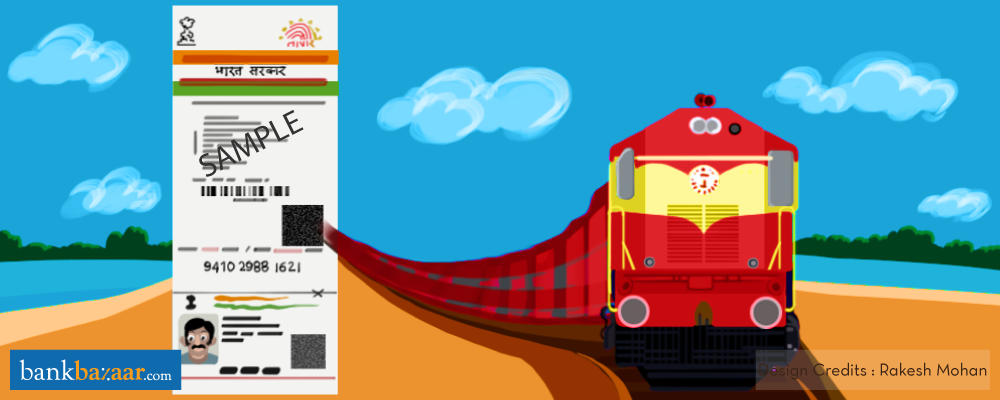
Railways are rightly dubbed the lifeline of the Indian economy. Large swathes of the nation would come to a halt if the railways were to come to a standstill. Despite the nation’s huge dependency on railway transportation, the booking of railway tickets is riddled with corruption. The beneficiaries are the middlemen who book tickets in plenty, using fake identities and then selling them at a premium. This, coupled with concessions provided to various categories of the Indian populace, bears down huge losses on the Indian Railway Catering and Tourism Corporation (IRCTC) each year.
Hence, to stem this problem and to streamline the railway ticketing process, IRCTC has decided to make Aadhaar-based ticketing mandatory for all. The authority aims to roll out the process in phases, with senior citizens to become the first beneficiaries and the rule to be later applicable to all by the end of December 2016.
About 96% of the Indian population is in possession of an Aadhaar Card with the handful remaining being driven to get one. According to news reports, IRCTC has already begun tying its database with Aadhaar data (the largest biometric identity project undertaken globally).
Since its launch, the government has urged people to link their Aadhaar cards to their bank accounts, gas connection accounts, and many other services where one can claim subsidies. This has been done to reduce corruption, red-tape, and black money and to introduce transparency in administrative work.
Additional Reading: The Aadhaar Card – A Step In The Right Direction
How does IRCTC plan to implement the process?
According to media reports, the project will be panned out in two phases. First, all those eligible to receive a concession under quotas will have to provide their Aadhaar number to avail benefits. In the second phase, which is expected to be completed by the end of December this year, all passengers will have to provide their Aadhaar numbers while booking tickets at the counter or online. Providing Aadhaar details will initially be compulsory for reserved tickets and will later be made mandatory to purchase unreserved tickets as well.Currently, a person can book six tickets using one Aadhaar Card. This, however, could change.
How will the ticket verification work with Aadhaar?
An individual will have to provide Aadhaar details while booking tickets. The same Aadhaar Card has to be furnished to the ticket collector while making the journey. To further verify the details of an individual, ticket checkers will carry with them terminal machines which will match the thumb prints of an individual to the Aadhaar number. This system will stop miscreants from travelling on fake identities.
What are the benefits of linking Aadhaar to railway ticket booking?
Here are some of the benefits:
Availability of concession: The First and foremost benefit of the plan is to provide concession on ticket booking to those who deserve it. Matching the Aadhaar details with the thumbprint of a person will ensure that the discount on the ticket price goes to the right person. IRCTC currently extends concessions under more than 50 categories, such as to senior citizens, physically disabled and army personnel.
Elimination of the middlemen: The middlemen control the Indian railway ticket process. Linking Aadhaar to railway tickets will prevent people from buying tickets in bulk and then selling them for a premium. This will also make seats available to people as and when they book tickets, which are otherwise blocked by agents.
Travel Insurance: Linking Aadhaar to Travel Insurance is indeed a good outcome of the process. Those individuals who book train tickets online, using Aadhaar, will be able to opt for Travel Insurance. Insurance will be offered for over-the-counter bookings as well. Linking Aadhaar to railway tickets will largely extend the benefit to those who buy unreserved tickets.
Check this: Aadhaar Based e-KYC: All You Need To Know
Now that you know about the many benefits of using your Aadhaar details to book your railway tickets, do leave us a comment in the comments section below and tell us what you think.
Good to hear ! One more inclusion .. under Aadhaar,.
Any initiative for inclusion of civic or consumer services under Aadhaar is a right step in right direction.
One can hope, by such value addition in phased manner, one day, Aadhaar will replace Bank A/C, PAN, Driving License or eve a mobile number !!
What is the harm or what difference it makes, if one’s Aadhaar Number is his bank account number or his mobile number or his College University Roll No. !!
I don’t even understand when Supreme court has given the decision regarding the obligation of Aadhar Card then why other companies making the Aadhar Linking Process mandatory. Indian Railways should not do such things until the final order of Supreme court
Hi Aadu, It is possible that Aadhaar-linking may be made compulsory across services in the country, depending on the Supreme Court’s decision. This is why most companies are quickly finishing up the linking process so that their services wouldn’t be affected post the ruling. Cheers, Team BankBazaar
We didn’t able to understand , without the official orders, government run departments made aadhar as compulsory for bookings in Indian Railways. First, the supreme court will dispatch the orders than afterwards it will go under more obligations.
Hi Durgadutt, While it is true that the Supreme Court is yet to rule on the constitutional validity of the Aadhaar, you can use any other valid ID proof to make your IRCTC bookings as well. Cheers, Team BankBazaar
hello sir ,Kya me aadhar card ke bina kisi or document se ticket book kr sakta hu kya?
Hi Durga, As of now, Aadhaar is not mandatory for booking train tickets. Cheers, Team BankBazaar